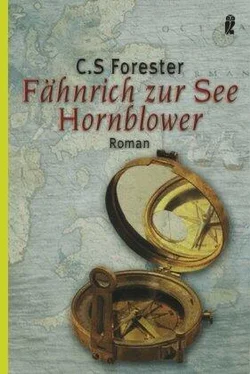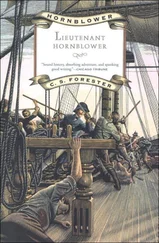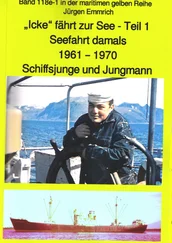Hornblower nodded to the sergeant, opened the front door and stepped out into the street. His lungs expanded gratefully as he breathed in the clean night air — morning air, rather, for there to the east the sky was assuming a lighter tinge — and the sentry, catching sight of the British naval officer, came clumsily to attention. In the square there still stood the gaunt harsh framework of the guillotine reaching up to the moonlit sky, and round it the black patch of the blood of its victims. Hornblower wondered who they were, who it could have been that the Royalists should seize and kill at such short notice, and he decided that they must have been petty officials of the Revolutionary government — the mayor and the customs officer and so on — if they were not merely men against whom the émigrés had cherished grudges since the days of the Revolution itself. It was a savage, merciless world, and at the moment he was very much alone in it, lonely, depressed, and unhappy.
He was distracted from these thoughts by the sergeant of the guard emerging from the door with a file of men; the sentry in the street was relieved, and the party went on round the house to relieve the others. Then across the street he saw four drummers appear from another house, with a sergeant commanding them. They formed into a line, their drumsticks poised high before their faces, and then at a word from the sergeant, the eight drumsticks fell together with a crash, and the drummers proceeded to march slowly along the street beating out a jerky exhilarating rhythm. At the first corner they stopped, and the drums rolled long and menacingly, and then they marched on again, beating out the previous rhythm. They were beating to arms, calling the men to their duties from their billets, and Hornblower, tone-deaf but highly sensitive to rhythm, thought it was fine music, real music. He turned back to headquarters with his depression fallen away from him. The sergeant of the guard came marching back with the relieved sentries; the first of the awakened soldiers were beginning to appear sleepily in the streets, and then, with a clatter of hoofs, a mounted messenger came riding up to headquarters, and the day was begun.
A pale young French officer read the note which the messenger brought, and politely handed it to Hornblower to read; he had to puzzle over it for a space — he was not accustomed to hand-written French — but its meaning became clear to him at length. It implied no new development; the main expeditionary force, landed yesterday at Quiberon, would move forward this morning on Vannes and Rennes while the subsidiary force to which Hornblower was attached must maintain its position at Muzillac, guarding its flank. The Marquis de Pouzauges, immaculate in his white uniform and blue ribbon, appeared at that moment, read the note without comment, and turned to Hornblower with a polite invitation to breakfast.
They went back to the big kitchen with its copper cooking pans glittering on the walls, and a silent woman brought them coffee and bread. She might be a patriotic Frenchwoman and an enthusiastic counter-revolutionary, but she showed no signs of it. Her feelings, of course, might easily have been influenced by the fact that this horde of men had taken over her house and were eating her food and sleeping in her rooms without payment. Maybe some of the horses and wagons seized for the use of the army were hers too — and maybe some of the people who had died under the guillotine last night were her friends. But she brought coffee, and the staff, standing about in the big kitchen with their spurs clinking, began to breakfast. Hornblower took his cup and a piece of bread — for four months before this his only bread had been ship's biscuit — and sipped at the stuff. He was not sure if he liked it; he had only tasted coffee three or four times before. But the second time he raised his cup to his lips he did not sip; before he could do so, the distant boom of a cannon made him lower his cup and stand stock still. The cannon shot was repeated, and again, and then it was echoed by a sharper, nearer note — Midshipman Bracegirdle's six-pounders on the causeway.
In the kitchen there was instant stir and bustle. Somebody knocked a cup over and sent a river of black liquid swirling across the table. Somebody else managed to catch his spurs together so that he stumbled into somebody else's arms. Everyone seemed to be speaking at once. Hornblower was as excited as the rest of them; he wanted to rush out and see what was happening, but he thought at that moment of the disciplined calm which he had seen in H.M.S. Indefatigable as she went into action. He was not of this breed of Frenchmen, and to prove it he made himself put his cup to his lips again and drink calmly. Already most of the staff had dashed out of the kitchen shouting for their horses. It would take time to saddle up; he met Pouzauges' eye as the latter strode up and down the kitchen, and drained his cup — a trifle too hot for comfort, but he felt it was a good gesture. There was bread to eat, and he made himself bite and chew and swallow, although he had no appetite; if he was to be in the field all day, he could not tell when he would get his next meal, and so he crammed a half loaf into his pocket.
The horses were being brought into the yard and saddled; the excitement had infected them, and they plunged and sidled about amid the curses of the officers. Pouzauges leapt up into his saddle and clattered away with the rest of the staff behind him, leaving behind only a single soldier holding Hornblower's roan. That was as it had better be — Hornblower knew that he would not keep his seat for half a minute if the horse took it into his head to plunge or rear. He walked slowly out to the animal, which was calmer now when the groom petted him, and climbed with infinite slowness and precaution into the saddle. With a pull at the bit he checked the brute's exuberance and walked it sedately into the street and towards the bridge in the wake of the galloping staff. It was better to make sure of arriving by keeping his horse down to a walk than to gallop and be thrown. The guns were still booming and he could see the puffs of smoke from Bracegirdle's six-pounders. On his left, the sun was rising in a clear sky.
At the bridge the situation seemed obvious enough. Where the arch had been blown up a few skirmishers on either side were firing at each other across the gap, and at the far end of the causeway, across the Marais, a cloud of smoke revealed the presence of a hostile battery firing slowly and at extreme range. Beside the causeway on this side were Bracegirdle's two six-pounders, almost perfectly covered by a dip in the ground. Bracegirdle, with his cutlass belted round him, was standing between the guns which his party of seamen were working, and he waved his hand lightheartedly at Hornblower when he caught sight of him. A dark column of infantry appeared on the distant causeway. Bang — bang went Bracegirdle's guns. Hornblower's horse plunged at the noise, distracting him, but when he had time to look again, the column had disappeared. Then suddenly the causeway parapet near him flew into splinters; something hit the roadbed beside his horse's feet a tremendous blow and passed on with a roar — that was the closest so far in his life that a cannon shot had missed him. He lost a stirrup during the resultant struggle with his horse, and deemed it wiser, as soon as he regained moderate control, to dismount and lead the animal off the causeway towards the guns. Bracegirdle met him with a grin.
"No chance of their crossing here," he said. "At least, not if the Frogs stick to their work, and it looks as if they're willing to. The gap's within grapeshot range, they'll never bridge it. Can't think what they're burning powder for."
"Testing our strength, I suppose," said Hornblower, with an air of infinite military wisdom.
Читать дальше











